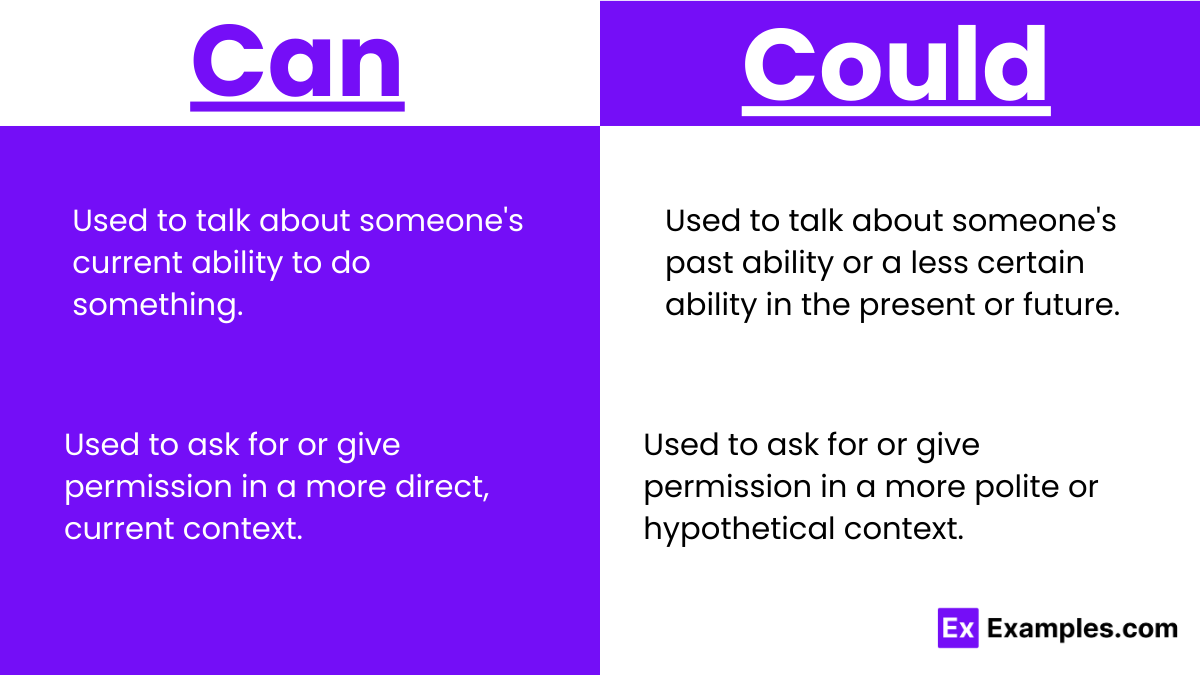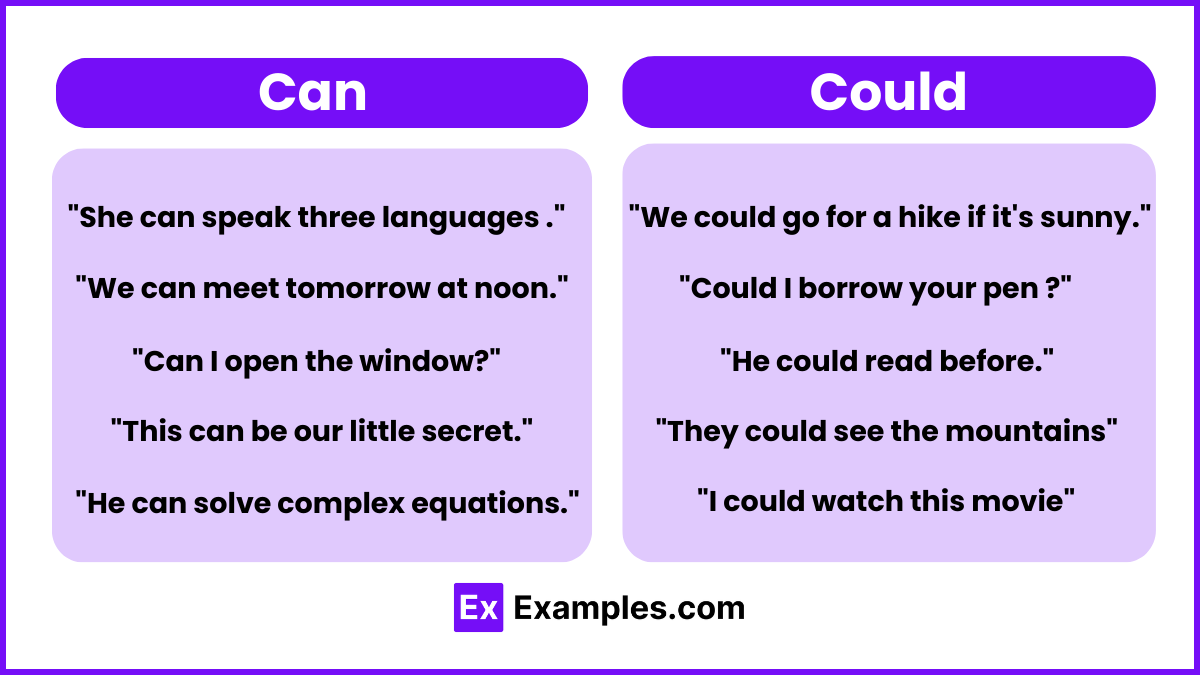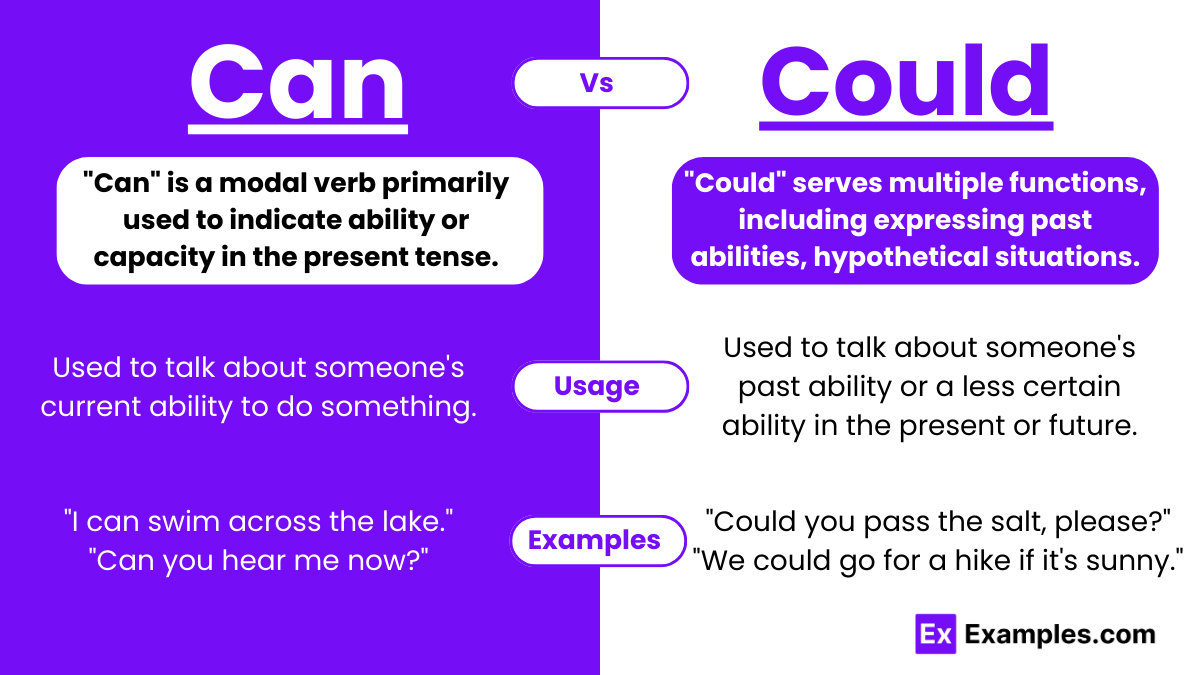Can vs Could – Examples, Difference, Usage
Understanding the distinction between “can” and “could” is pivotal for constructing clear and accurate sentences. Both terms, functioning as modal verbs, are instrumental in expressing abilities, possibilities, and seeking permission. However, they are not interchangeable and bear nuanced differences in usage. “Can” is typically employed to indicate a high likelihood of an event occurring in the future or to denote someone’s current ability, while “could” is used to suggest a more uncertain possibility or to refer to past abilities. This article aims to demystify the rules governing their use, shedding light on when and how to correctly apply “can” and “could” in various contexts.
Can vs Could – Meanings
Navigating the nuances of “can” and “could” reveals the flexibility and depth of the English language. These verbs, integral to expressing ability, possibility, and permission, are often used interchangeably but embody distinct nuances that enrich communication.
Can
“Can” is a modal verb primarily used to indicate ability or capacity in the present tense. It signifies what someone or something is capable of doing or what is possible. Moreover, “can” is employed to request or grant permission in a direct, contemporary context.
- Ability: “She can solve complex math problems effortlessly.”
- Permission: “Can I leave the table?”
- Possibility: “You can see the stars on a clear night.”
Could
“Could” is the past tense form of “can” and serves multiple functions, including expressing past abilities, hypothetical situations, polite requests, or future possibilities under specific conditions.
- Past Ability: “When he was younger, he could run marathons.”
- Polite Request: “Could you please lower the music?”
- Hypothetical Situations: “If I had time, I could travel the world.”
- Future Possibility: “With hard work, you could become a great artist.”
While both “can” and “could” explore the realms of possibility and ability, “can” is more straightforward and present-focused, whereas “could” introduces an element of speculation, politeness, or uncertainty, often relating to past abilities or hypothetical scenarios. Understanding the distinctions between these two verbs enhances clarity and precision in communication.
Difference Between Can and Could
| Aspect | Can | Could |
|---|---|---|
| Meaning | “Can” expresses ability, possibility, or permission in the present tense. | “Could” is the past tense form of “can” and is used to express ability or possibility in the past, or a conditional possibility in the present or future. |
| Usage for Ability | Used to talk about someone’s current ability to do something. | Used to talk about someone’s past ability or a less certain ability in the present or future. |
| Usage for Possibility | Indicates that something is likely to happen or is very possible. | Indicates a hypothetical situation or something that has a chance of happening but is less certain. |
| Usage for Permission | Used to ask for or give permission in a more direct, current context. | Used to ask for or give permission in a more polite or hypothetical context. |
| Examples | – I can swim. (Present ability)<br> – Can you help me? (Asking for permission) | – I could swim when I was younger. (Past ability)<br> – Could you please help me? (Polite request) |
How to Remember Difference
- Present vs. Past Ability:
- Can is used for expressing the ability to do something in the present.
- Could refers to an ability in the past. Think of “could” as the past tense of “can”.
- Possibility and Probability:
- Use can when something is likely to happen or when speaking about a general possibility in the present or future.
- Use could to indicate a conditional possibility, suggesting that something might happen under certain conditions, or when the likelihood is uncertain.
- Permission:
- Can is less formal and more commonly used in everyday scenarios when asking for or giving permission.
- Could is often used as a polite or formal way of asking for permission, especially in indirect or more respectful inquiries.
- Requests and Suggestions:
- Can is used for direct requests.
- Could can make requests sound more polite or tentative and is often used for making suggestions.
- Mnemonic Device:
- Think of C in Can as “Current” capability or possibility.
- Think of Coul in Could as “Conditional” or “Could’ve” for past abilities.
To distinguish between “can” and “could” in English grammar, remember that “can” is used to express present abilities or very likely possibilities and for informal requests or permissions. In contrast, “could” serves to indicate past abilities, conditional possibilities, polite requests, or suggestions. The key is to associate “can” with current or definite scenarios and “could” with conditional, past, or polite contexts. Utilizing mnemonic devices such as linking “Can” with “Current capability” and “Could” with “Conditional or Could’ve (past abilities)” can aid in recalling their appropriate usage. Practicing these distinctions in speech and writing will help cement understanding of when and how to use each modal verb correctly.
When to use Can and Could

Choosing between “can” and “could” is crucial for accurate and nuanced English communication. Each verb serves specific functions, influenced by the context of ability, possibility, permission, and time. Here’s a concise guide on when to use each.
Use “Can” for:
- Present Abilities: When referring to someone’s current skills or capacities. Example: “She can speak four languages.”
- Immediate Permission: To ask for or give permission in the present. Example: “Can I use your phone?”
- Present or General Possibilities: To indicate something is possible now or in general. Example: “You can catch a bus at this hour.”
Use “Could” for:
- Past Abilities: To discuss abilities someone had in the past but may not have now. Example: “He could swim across the lake when he was a kid.”
- Polite Requests or Offers: For more courteous expressions of requests or offers. Example: “Could you help me with this?”
- Hypothetical Situations: To speculate about what might be possible under different circumstances. Example: “You could save more money if you cooked at home.”
- Future Possibilities in Conditional Sentences: When talking about potential future outcomes based on conditions. Example: “If it rains, we could cancel the trip.”
Understanding the contexts and nuances of “can” and “could” not only enhances your grammatical accuracy but also enriches your ability to express subtleties in mood, politeness, and possibility. This distinction ensures clearer and more effective communication, whether you’re conveying abilities, asking for permission, or discussing potential outcomes.
Examples of Can and Could

Examples of “Can”
- Ability: “I can swim faster than I did last year.”
- Demonstrates a present ability or skill.
- Permission: “Can I borrow your book for the weekend?”
- Asks for permission in a direct, straightforward manner.
- Possibility: “We can see the northern lights from here in winter.”
- Indicates that something is possible.
- “I can solve this puzzle in under a minute.”
- “Can we start the meeting now?”
- “You can find rare birds in this forest.”
Examples of “Could”
- Past Ability: “When she was younger, she could climb the highest trees.”
- Refers to an ability someone had in the past.
- Polite Request: “Could you please turn down the music?”
- Expresses a request in a polite, less direct way.
- Hypothetical Situation: “If I had more time, I could learn to play the piano.”
- Speaks about a situation that is possible under certain conditions.
- Future Possibility in Conditional Sentences: “We could go to the beach tomorrow if the weather is nice.”
- Discusses a future event that is dependent on another condition being met.
- “She could read before she started school.”
- “Could you lower your voice, please?”
- “We could have won the game with a bit more practice.”
FAQs
Should I use can I or could I?
Use “can I” for direct requests or to inquire about capability. “Could I” is more polite or speculative, often used in formal or uncertain contexts.
Can you replace can with could?
Replacing “can” with “could” adds a layer of politeness or hypothetical meaning. However, it’s context-dependent; “could” implies possibility or past ability.
Can we use can and could interchangeably?
“Can” and “could” are not always interchangeable. “Can” refers to present ability or permission, while “could” suggests politeness, possibility, or past ability.
Can or could you speak English?
“Can you speak English?” asks about current ability. “Could you speak English?” is more polite, suggesting a request or hypothetical situation.



